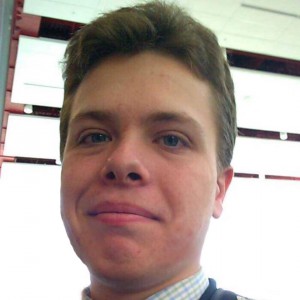Meet the Intern: Aidan Bissell-Siders

Please welcome the communications intern for Fall 2016, Aidan Bissell-Siders!
TheHumanist.com: What is your educational and work background?
I’m a freshman at the University of Maryland, College Park. I study biochemistry and hope to minor in statistics. I’m interested in both medical research and genetic engineering because I believe both hold vast potential for good—and they’re really cool. This interest in the medical applications of science stems from volunteering in the pathology labs at St. Joseph’s Medical Center and the Greater Baltimore Medical Center. To be able to “stain” tissue samples in order to find foreign objects is not just cool—it’s life-saving.
TheHumanist.com: How did you first learn about humanism?
I spent a huge chunk of high school competing in Lincoln-Douglas debate, a debate format that analyzes the intersection of morality and policy. Every two months, a new topic would roll around. And every two months, every debater had to write an affirmative case (supporting the topic) and a negative case (attacking it), both of which had to argue for a moral theory of right and wrong. Exploring various ethics really got me thinking about what right and wrong are, which led down a path to looking at the morality of humanism.
TheHumanist.com: Did you grow up in a traditional religious faith? How did it impact you?

Aidan Bissell-Siders
While my family is not religious, my Catholic high school certainly was. As a lifelong atheist, I was always a bit of an outsider. This distance gave me a real vantage point on my environment. To me, the school held contradictory messages. On the one hand, the school preached community, respect, and social justice (in the Jesuit sense). On the other, it failed to provide any real sex education, create a culture of gender equality, or substantially attack religious intolerance—all of which I believe to be quite necessary for genuine social justice. My schooling brought me close to Catholicism in practice and convinced me that it is not beautiful.
TheHumanist.com: What interested you most about interning for the American Humanist Association?
Every organization talks about change. The AHA actually makes it happen. When I saw how many programs the AHA runs and how many social justice causes it engages, I was hooked. Being able to help dismantle arbitrary barriers that hold citizens back—as the AHA does in every arena—is just wonderful.
TheHumanist.com: What book has influenced you the most?
Despite its flaws, William Shirer’s The Rise and Fall of the Third Reich is quintessential to an understanding of how authoritarianism happens. Shirer documents how the Nazi regime intentionally used humanity’s basest emotions—otherization, nationalism, and fear of change—to stoke support for a violent state. Trading freedom for security is easier in the face of a common terror. Most worrying are the similarities between appeals to common faith and country in Nazi Germany and in contemporary politics. Humans have not changed, and Shirer’s dystopia is not a myth of the past. We must be vigilant against intolerance.
TheHumanist.com: If you could have dinner with any three people in the world (living or dead), who would they be and why?
Jesus Christ, three times over. The one from Mark’s Gospel, the one from Matthew/Q’s, and the one from John’s.
